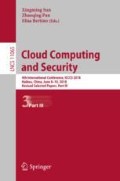Abstract
In this paper it presents a new dependency parsing tree (DPT) generation algorithm. Different from other similar algorithms, which based on statistical probability model, the algorithm converts the dependency parsing tree generation problem into a semantic segments dividing problem. In this paper, the co-occurrence frequency of words is firstly analyzed, and it is pointed out that the co-occurrence frequency of words can be used as the basis for the judgment of semantic dependence relationship between words. Then it further analyzes the change of co-occurrence frequency entropy of words in a semantic unit (sentence is used as the basic semantic unit in this paper). And we present an algorithm to divide a sentence into semantic fragments in which words has tight semantic relationship with each other. Based on the above work, this paper divides the DPT generation algorithm into three steps. The first step is to divide the sentence into semantic fragments. The second step is to distinguish semantic core word and non-semantic core words according to the semantic dependency relationship between words in a semantic fragment. Then in the last step the DPT is generated according semantic dependency relationship between semantic core words. Based on court documents which collected from web, the experiments of our DPT generation algorithm are conducted in this paper. And the results show that the DPT generation algorithm in this paper maintains a high degree of consistency with the DPT tree generated by human.
Access this chapter
Tax calculation will be finalised at checkout
Purchases are for personal use only
References
Nivre, J.: Dependency grammar and dependency parsing. MSI Rep. 2005(5133), 1–32 (1959)
Tesnière, L.: Eléments de syntaxe structurale (1965)
Hudson, R.A.: Word Grammar. Blackwell, Oxford (1984)
Sgall, P., Hajicová, E., Panevová, J.: The Meaning of the Sentence in its Semantic and Pragmatic Aspects. Springer, Heidelberg (1986)
Eisner, J.M.: Three new probabilistic models for dependency parsing: an exploration. In: Proceedings of the 16th Conference on Computational Linguistics, vol. 1, pp. 340–345. Association for Computational Linguistics (1996)
Carreras, X.: Experiments with a higher-order projective dependency parser. In: Proceedings of the 2007 Joint Conference on Empirical Methods in Natural Language Processing and Computational Natural Language Learning (EMNLP-CoNLL) (2007)
McDonald, R., Pereira, F.: Online learning of approximate dependency parsing algorithms. In: 11th Conference of the European Chapter of the Association for Computational Linguistics (2006)
Nivre, J., Scholz, M.: Deterministic dependency parsing of English text. In: Proceedings of the 20th International Conference on Computational Linguistics, p. 64. Association for Computational Linguistics (2004)
Yamada, H., Matsumoto, Y.: Statistical dependency analysis with support vector machines. In: Proceedings of IWPT, vol. 3, pp. 195–206 (2003)
Bohnet, B., McDonald, R., Pitler, E., et al.: Generalized transition-based dependency parsing via control parameters. In: Proceedings of the 54th Annual Meeting of the Association for Computational Linguistics (Volume 1: Long Papers), vol. 1, pp. 150–160 (2016)
Charniak, E.: A maximum-entropy-inspired parser. In: Proceedings of the 1st North American chapter of the Association for Computational Linguistics conference, pp. 132–139. Association for Computational Linguistics (2000)
Lafferty, J., McCallum, A., Pereira, F.C.N.: Conditional random fields: probabilistic models for segmenting and labeling sequence data (2001)
Author information
Authors and Affiliations
Corresponding author
Editor information
Editors and Affiliations
Rights and permissions
Copyright information
© 2018 Springer Nature Switzerland AG
About this paper
Cite this paper
Han, J., Xu, W.L., Jing, Y.T. (2018). A New Dependency Parsing Tree Generation Algorithm Based on the Semantic Dependency Relationship Between Words. In: Sun, X., Pan, Z., Bertino, E. (eds) Cloud Computing and Security. ICCCS 2018. Lecture Notes in Computer Science(), vol 11065. Springer, Cham. https://doi.org/10.1007/978-3-030-00012-7_37
Download citation
DOI: https://doi.org/10.1007/978-3-030-00012-7_37
Published:
Publisher Name: Springer, Cham
Print ISBN: 978-3-030-00011-0
Online ISBN: 978-3-030-00012-7
eBook Packages: Computer ScienceComputer Science (R0)

